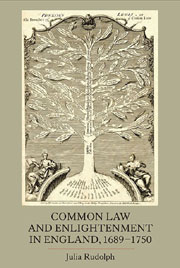Book contents
- Frontmatter
- Contents
- Acknowledgements
- Abbreviations
- 1 Against Decline
- 2 Law Books, Legal Knowledge and Enlightened Encyclopedism
- 3 Expertise and Evidentiary Practices in Science and Law
- 4 Common Law, Credit and the Growth of Commerce
- 5 Common Law Jurisprudence and the Philosophy of Natural Law
- 6 Common Law and the Morality of Markets
- 7 Legal Histories and Enlightened Historiography
- Conclusion
- Bibliography
- Index
- STUDIES IN EARLY MODERN CULTURAL, POLITICAL AND SOCIAL HISTORY
2 - Law Books, Legal Knowledge and Enlightened Encyclopedism
Published online by Cambridge University Press: 05 May 2013
- Frontmatter
- Contents
- Acknowledgements
- Abbreviations
- 1 Against Decline
- 2 Law Books, Legal Knowledge and Enlightened Encyclopedism
- 3 Expertise and Evidentiary Practices in Science and Law
- 4 Common Law, Credit and the Growth of Commerce
- 5 Common Law Jurisprudence and the Philosophy of Natural Law
- 6 Common Law and the Morality of Markets
- 7 Legal Histories and Enlightened Historiography
- Conclusion
- Bibliography
- Index
- STUDIES IN EARLY MODERN CULTURAL, POLITICAL AND SOCIAL HISTORY
Summary
… but though I recommend to him to have a large Common Place-Book, I do not in the least insinuate that the Person who has the largest is the greatest Lawyer, any more than I do that he is, who hath the greatest Head: Things must be clear and well digested in both Cases, to make a man compleat.
Giles Jacob, The Student's Companion: Or, The Reason of the Laws of EnglandGiles Jacob's joking aside to his reader is rich with double meanings. His humorous, because absurd, denial that he is equating large notebooks or large body parts with legal prowess is a rhetorical flourish, a characteristic eighteenth-century satirical jibe. It is also, possibly, a ribald pun (and this from the purported author of the obscene Tractatus de hermaphroditis) on the manly anatomy of the ‘greatest Lawyer’, and a winking reference to the so-called temptations for the law student among the prostitutes, the ‘pleasure grounds and fleshpots’, which were in close proximity to the early modern Inns of Court. Jacob's imagery may also have traded upon familiarity with the language of body politic, of head and members in proportion and not subject to the outsized, absolutist pretensions of an overweening head. Most clearly, however, Jacob is punning on the identity between the lawyer's, or law student's, head and the commonplace heading – the alphabetical heads or titles that provide the structure for the student's notebook and for Jacob's ensuing text.
- Type
- Chapter
- Information
- Common Law and Enlightenment in England, 1689-1750 , pp. 30 - 82Publisher: Boydell & BrewerPrint publication year: 2013



